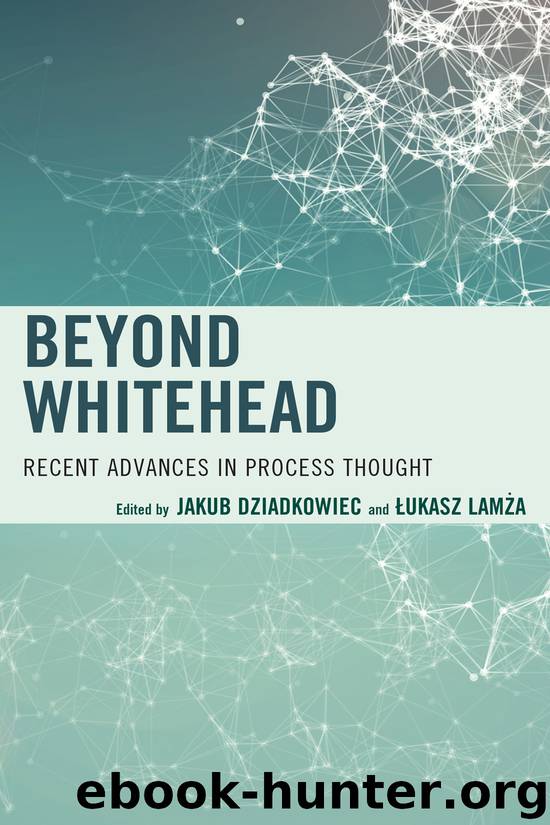Beyond Whitehead by Dziadkowiec Jakub & Łukasz Lamża

Author:Dziadkowiec, Jakub & Łukasz Lamża
Language: eng
Format: epub
Publisher: Lexington Books, a division of Rowman & Littlefield Publishers, Inc.
Part II
REVISIONS AND CHALLENGES
INTRODUCTION BY ŁUKASZ LAMŻA
There is a persistent controversy related to the process of criticizing and amending philosophical theories. For many, the classical texts of famous philosophers amount to holy scripture, and, unfortunately, philosophical education does not lead to open-mindedness when it comes to discuss strong and weak points of given philosophies. Therefore, there is usually some agitation when one proposes corrections to established philosophical systems—even if the matter at hand is a seemingly harmless act of re-interpretation.
Whitehead himself was incredibly open toward the idea of his philosophy being a work in progress. Although his Process and Reality, the canonical text for process thinkers, may at a first glance seem to be as a very carefully structured and closed entity, it constantly invites the reader to be critical of what is being described along the way. During the twentieth century there has been a pronounced tendency to build upon Whitehead’s process and apply it to specific problems within philosophy and outside of it, rather than to thoroughly rethink it, with two good examples of that tendency being the spectacular development of process theology and the amazing wealth of texts that confront scientific knowledge with process thinking. On the other hand, the thinkers that did decide to critically reconstruct Whitehead’s basic intuitions, such as C. Hartshorne or P. Weiss, usually ended up creating their own philosophies.
Here, in Part II, we have decided to publish five texts that occupy the “middle ground”—neither overturning Whitehead nor simply commenting on it in an impartial manner. The idea was to show how basic process metaphysics can be “pushed” or “nudged” in different directions.
The paper by Vesselin Petrov offers a panoramic view of how philosophy and science of the twentieth century slowly turned away from mechanistic atomism toward what he describes, following Karen Gloy, as dynamic holism—or at least, how it should do so. The article is particularly valuable in that it sheds light on the broader philosophical context of process thinking; also, it is refreshing to see the term “postmodernism” used in its older, pre-Lyotardian sense. The section on systemic thinking will be of great value for scholars of Whitehead, as they will undoubtedly recognize the processual counterpart to the “invariances of organization” described by the celebrated, if controversial, system theorist Ervin Laszlo.
The following two papers pursue the remarkable congruence exhibited by the philosophies of A. N. Whitehead and N. Hartmann. Both ontologies are still attractive because they are strongly rooted in Western philosophy and their authors had not only respect for contemporary science, but were strongly inspired by it without resorting to scientism. While Whitehead and Hartmann may be seen at first sight as representatives of completely different philosophical traditions—Hartmann being traditionally described as a Neo-Kantian, and Whitehead usually regarded as a creator of a completely new school of thought against the backdrop of traditional process intuitions and Anglo-American philosophy—it is worthwhile going deeper into the subject.
Maria-Teresa Teixeira describes both thinkers as process philosophers and offers a systematic, thorough analysis of their individual takes on the idea of dynamical ontology.
Download
This site does not store any files on its server. We only index and link to content provided by other sites. Please contact the content providers to delete copyright contents if any and email us, we'll remove relevant links or contents immediately.
| Anthropology | Archaeology |
| Philosophy | Politics & Government |
| Social Sciences | Sociology |
| Women's Studies |
The remains of the day by Kazuo Ishiguro(9000)
Tools of Titans by Timothy Ferriss(8398)
Giovanni's Room by James Baldwin(7347)
The Black Swan by Nassim Nicholas Taleb(7131)
Inner Engineering: A Yogi's Guide to Joy by Sadhguru(6797)
The Way of Zen by Alan W. Watts(6615)
The Power of Now: A Guide to Spiritual Enlightenment by Eckhart Tolle(5784)
Asking the Right Questions: A Guide to Critical Thinking by M. Neil Browne & Stuart M. Keeley(5775)
The Six Wives Of Henry VIII (WOMEN IN HISTORY) by Fraser Antonia(5516)
Astrophysics for People in a Hurry by Neil DeGrasse Tyson(5191)
Housekeeping by Marilynne Robinson(4449)
12 Rules for Life by Jordan B. Peterson(4306)
Ikigai by Héctor García & Francesc Miralles(4275)
Double Down (Diary of a Wimpy Kid Book 11) by Jeff Kinney(4273)
The Ethical Slut by Janet W. Hardy(4258)
Skin in the Game by Nassim Nicholas Taleb(4250)
The Art of Happiness by The Dalai Lama(4130)
Skin in the Game: Hidden Asymmetries in Daily Life by Nassim Nicholas Taleb(4007)
Walking by Henry David Thoreau(3963)
